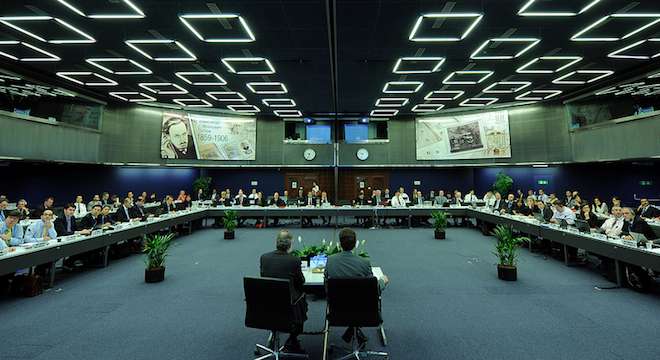Google has jumped headfirst into the debate surrounding an upcoming United Nations telecommunications summit, launching a campaign Tuesday to encourage Web users to sign a petition advocating for a “free and open Web,” while at the same time decrying the conference as a “closed-door meeting,” involving proposals from world governments to “increase censorship and regulate the Internet.”
But now, the UN telecom agency in charge of the conference, the International Telecommunications Union (ITU), has responded to Google’s campaign, telling TPM that such a move was not unexpected.
“It did not come as a surprise, if that is what you mean,” said ITU spokesperson Sarah Parkes in a statement to TPM. “I believe as a UN agency we feel that everyone is free to lobby for their position, they all have their own viewpoint and we need to hear all voices. We regret that Google did not choose to join ITU as a member so that it could participate in its own right in the WCIT preparatory process.”
Indeed, aside from the 193 member states that make up the United Nations, the ITU also includes some representatives from some 700 non-governmental organizations, companies and academic institutions, who contribute their own views and advice to proposed international telecommunications agreements. However, membership in the ITU is paid and expensive, costing tens of thousands of dollars a year, depending on the type of organization that wants to join.
Google, for its part, may not be a member of the ITU, but Parkes said that the search leader did participate in “some meetings” in the run-up to the upcoming conference — scheduled for December 3 through the 14th in Dubai — as part of the U.S. delegation.
Google declined to comment further on the record than the following statement issued by its spokesperson: “More than 100 organizations from 50+ countries have raised concerns about an upcoming closed-door meeting in December in Dubai, where governments will consider proposals to increase regulation and censorship of the Internet. People can learn more about the issue on our website — and if they choose to do so, can pledge their support for a free and open Internet.”
However, Google developer advocate Tim Bray did post a note on his own Google Plus profile page on Tuesday, writing that “smart people here at Google are actually looking worried” about the possibility that the ITU conference could see some governments attempt to enact new international agreements to tax heavily trafficked websites such as Google and Facebook, or to give themselves more powers and UN endorsement to monitor Web user content and censor some of it in the name of cybersecurity or fighting spam.
Other sources with knowledge of the ITU’s private sector membership pointed out that it is ultimately the national governments that will decide which, if any, new updates are made to international tecommunications agreements, and that even those private sector members who are invited to the conference in Dubai aren’t allowed to speak during the official negotiation period between government representatives.
Google is hardly the only organization to go on the record with concerns about the ITU conference, called the World Conference on International Telecommunications 2012 (WCIT-12).
In fact, across the globe, hundreds of organizations and companies have spoken out either in opposition to the conference itself or to some specific proposals for new Internet governance powers floated by representatives of Russia, China, Iran, Eastern European nations and other Arabic states.
Many of those organizations have signed onto a separate online petition called “Protect Global Internet Freedom,” maintained by Web freedom advocacy groups Open Media International, originating in Canada, and the U.S.-based Center for Democracy and Technology (CDT).
Another influential American Web freedom advocacy group, the Electronic Frontier Foundation, has also spoke out against the WCIT-12 conference and the ITU, with EFF staffer Jillian C. York, director of international freedom of expression, writing on Tuesday:
“WCIT could result in decision-making capabilities over the Internet being handed to the International Telecommunication Union (ITU), a government-controlled agency of the United Nations, a scary thought given that some of the proposals being brought to the table would threaten privacy and legitimize censorship and surveillance.”
Earlier this year, Congressional Republicans also sounded alarm bells about the conference.
The ITU, which over the course of the year has repeatedly attempted to battle back against claims that the conference is or will result in a sinister power grab, or “takeover” of the Internet, for its part continues to maintain that such concerns are overblown and betray a fundamental misunderstanding of how the WCIT-12 conference, and the agency itself, function.
“Article 19 of the UN Covenant on Civil and Political Rights and Article 33 and 34 of the ITU Constitution establish the right to communication and the limits that governments can impose on those rights,” Parkes told TPM. “Since the ITU Constitution prevails over the ITRs, nothing in the ITRs could result in a reduction of freedom to communicate.”
The WCIT-12 conference is being held to update a series of international agreements, the International Telecommunications Regulations (ITRs), that were previously reached in 1988, before the rapid expansion and commercialization of the Internet. Those agreements focused mainly on the increasingly popular technologies of the time — cable TV, long distance calling. So the ITU and its member states are meeting in Dubai this year to see if they should be updated and expanded to address the Internet, and if so, in what ways. The ITU itself has stressed the need for international cooperation on cybersecurity.






